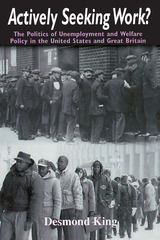
The goal of work-welfare policy in both countries has been to provide financial aid, training, and placement services for the unemployed. In order to muster support for these programs, however, work-welfare programs had to incorporate liberal requirements that they not interfere with private market forces, and that they prevent the "undeserving" from obtaining benefits. For King, the attempt to integrate these incompatible functions is the defining feature of British and American policies as well as the cause of their failure.
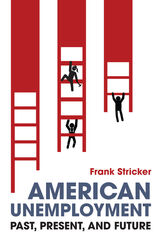
- Workers do not normally choose to be unemployed.
- In our current system, persistent unemployment is not an aberration. It is much more common than full employment, and the outcome of elite policy choices.
- Labor surpluses propped up by flawed unemployment numbers have helped to keep real wages stagnant for more than forty years.
- Prior to the New Deal and the era of big government, laissez-faire policies repeatedly led to depressions with heavy, even catastrophic, job losses.
- Undercounting the unemployed sabotages the creation of government job programs that can lead to more high-paying jobs and full employment.
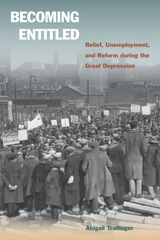
In the 1930s, the unemployed were organizing. Jobless workers felt they were “entitled" to a new kind of government protection—the protection from undeserved unemployment and the financial straits that such unemployment created. They wanted dignified forms of relief (including work relief) during the Depression, and unemployment insurance after.
Becoming Entitled artfully chronicles the emergence of this worker entitlement and the people who cultivated it. Abigail Trollinger focuses largely on Chicago after the Progressive Era, where the settlement house and labor movements both flourished. She shows how reformers joined workers and relief officials to redeem the unemployed and secure government-funded social insurance for them. Becoming Entitled also offers a critical reappraisal of New Deal social and economic changes, suggesting that the transformations of the 1930s came from reformers in the “middle,” who helped establish a limited form of entitlement for workers.
Ultimately, Trollinger highlights the achievements made by reformers working on city- and nation-wide issues. She captures the moment when some people shed the stigma that came with unemployment and demanded that the government do the same.
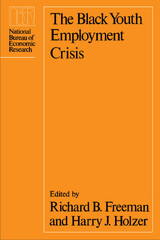
The contributors identify primary determinants on both the demand and supply sides of the market and provide new information on important aspects of the problem, such as drug use, crime, economic incentives, and attitudes among the unemployed. Their studies reveal that, contrary to popular assumptions, no single factor is the predominant cause of black youth employment problems. They show, among other significant factors, that where female employment is high, black youth employment is low; that even in areas where there are many jobs, black youths get relatively few of them; that the perceived risks and rewards of crime affect decisions to work or to engage in illegal activity; and that churchgoing and aspirations affect the success of black youths in finding employment.
Altogether, these papers illuminate a broad range of economic and social factors which must be understood by policymakers before the black youth employment crisis can be successfully addressed.
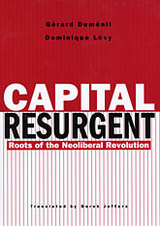
The advent of economic neoliberalism in the 1980s triggered a shift in the world economy. In the three decades following World War II, now considered a golden age of capitalism, economic growth was high and income inequality decreasing. But in the mid-1970s this social compact was broken as the world economy entered the stagflation crisis, following a decline in the profitability of capital. This crisis opened a new phase of stagnating growth and wages, and unemployment. Interest rates as well as dividend flows rose, and income inequality widened.
Economists Gérard Duménil and Dominique Lévy show that, despite free market platitudes, neoliberalism was a planned effort by financial interests against the postwar Keynesian compromise. The cluster of neoliberal policies--including privatization, liberalization of world trade, and reduction in state welfare benefits--is an expression of the power of finance in the world economy.
The sequence of events initiated by neoliberalism was not unprecedented. In the late nineteenth century, when economic conditions were similar to those of the 1970s, a structural crisis led to the first financial hegemony culminating in the speculative boom of the late 1920s. The authors argue persuasively for stabilizing the world economy before we run headlong into another economic disaster.
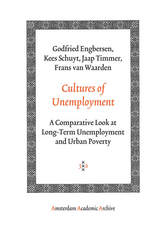

This book sets forth both a theory and a comparative empirical analysis of stagflation, that peculiar combination of high unemployment, slow growth, and spurts of high inflation bedeviling the advanced industrial nations during the past fifteen years.
The authors first construct a small macroeconomic model that takes full account of aggregate demand and supply forces in the determination of output, employment, and the price level, in both a single-economy and a multi-economy setting. They then apply the model to provide an understanding of comparative performance of industrial countries in the areas of unemployment, inflation, productivity, and investment growth. They argue convincingly that the decay of the major economies during this period resulted from the supply shocks of the 1970s, such as the two major OPEC oil-price increases, and from the consequent policy-induced decrease in demand in response to inflationary pressures. Their analysis differs markedly from similar studies in that it takes specific account of institutional differences in the labor markets of the various economies. This helps to explain in particular the divergent adjustment profiles of the United States and Europe.
Michael Bruno and Jeffrey D. Sachs make several key recommendations for the mix of demand management and incomes policies necessary to combat stagflation in individual countries as well as for the coordination of macroeconomic policies among the major industrial nations.
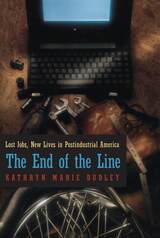
"An excellent study not only of the cultural disruptions caused by the shutdown of Chrysler's operations in Kenosha, Wisconsin, but also of the ideology of progress that abetted the shutdown."—Stephen Amberg, Industrial and Labor Relations Review
"With the eye of an anthropologist, [Dudley] examines the tensions between the 'culture of hands' and the 'culture of mind.' Her account is especially instructive because, by many measures, Kenosha has successfully recovered, yet for many the pain still remains."—Booklist
"Exceptional. . . . Should be widely read."—Douglas Harper, Contemporary Sociology
"Make[s] clear what a tenuous concept economic security is, especially when the rules for achieving security are in flux."—Barbara Presley Noble, New York Times

Wendy Wimmer’s debut short story collection, Entry Level, contains a range of characters who are trying to find, assert, or salvage their identities. These fifteen stories center around the experience of being underemployed—whether by circumstance, class, gender, race, or other prevailing factors—and the toll this takes on an individual. Wimmer pushes the boundaries of reality, creating stories that are funny, fantastic, and at times terrifying. Her characters undergo feats of endurance, heartbreak, and loneliness, all while trying to succeed in a world that so often undervalues them. From a young marine biologist suffering from imposter syndrome and a haunting to a bingo caller facing another brutal snowstorm and a creature that may or not be an angel, Wimmer’s characters are all confronting an oppressive universe that seemingly operates against them or is, at best, indifferent to them. These stories reflect on the difficulties of modern-day survival and remind us that piecing together a life demands both hope and resilience.
Entry Level was selected by Deesha Philyaw as the winner of the 2021 Autumn House Fiction Prize.
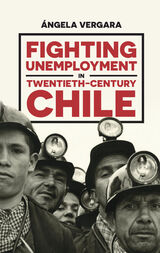
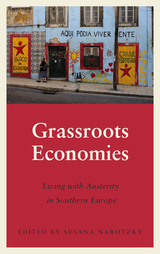
Grassroots Economies interrogates the effects of the economic crisis on the livelihood of working people, providing insight into their anxieties. Drawing on a rich seam of ethnographic material, it is a distinctive comparative analysis that explores the contradictions of their coping mechanisms and support structures.
With a focus on gender, the book explores values and ideologies, including dispossession and accumulation. Ultimately it demonstrates that everyday interactions on the local scale provide a significant sense of the global.

How do ambitious young men grapple with an unemployment rate in urban Ethiopia hovering around fifty percent? Urban, educated, and unemployed young men have been the primary force behind the recent unrest and revolutions in North Africa and the Middle East. Daniel Mains' detailed and moving ethnographic study, Hope is Cut, examines young men's struggles to retain hope for the future in the midst of economic uncertainty and cultural globalization.
Through a close ethnographic examination of young men's day-to-day lives Hope is Cut explores the construction of optimism through activities like formal schooling, the consumption of international films, and the use of khat, a mild stimulant.
Mains also provides a consideration of social theories concerning space, time, and capitalism. Young men here experience unemployment as a problem of time—they often congregate on street corners, joking that the only change in their lives is the sun rising and setting. Mains addresses these factors and the importance of reciprocity and international migration as a means of overcoming the barriers to attaining aspirations.
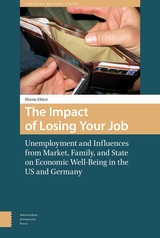

It is commonplace in contemporary American politics for those who experience economic strain to join together and ask the government for help. The unemployed, by and large, have not done so. In their study, Kay Lehman Schlozman and Sidney Verba look closely at the unemployed and ask why not.
Using the results of a large-scale survey supplemented by intensive interviews, the authors consider the political attitudes and behavior of the unemployed: how much hardship they feel, how they interpret their joblessness, what they do about it, how they view the American social order, and how they vote or otherwise take part in politics. The analysis is placed in the context of several larger concerns: the relationship between stress in private life and conduct in public life, the circumstances under which the disadvantaged are mobilized for politics, the changing role of social class in America, and the links between politics and macroeconomic conditions.

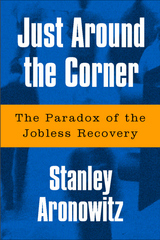
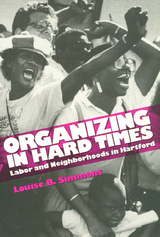
In 1990, Hartford, Connecticut, ranked as the eight poorest city in the country by the census; the real estate market was severely depressed; downtown insurance companies were laying off and the retail department stores were closing; public services were strained; and demolition sites abandoned for lack of funds pockmarked the streets. Hartford's problems are typical of those experienced in numerous U.S. cities affected by a lingering recession.
The harsh economic times felt throughout the city's workplaces and neighborhoods precipitated the formation of grassroots alliances between labor and community organizations. Coming together to create new techniques, their work has national implications for the development of alternative strategies for stimulating economic recovery.
Louise B. Simmons, a former Hartford City Councilperson, offers an insider's view of these coalitions, focusing on three activist unions—rhe New England Health Care Employees Union, the Hotel and Restaurant Employees, and the United Auto Workers—and three community groups—Hartford Areas Rally Together, Organized North Easterners-Clay Hill and North End, and Asylum Hill Organizing Project. Her in-depth analysis illustrates these groups' successes and difficulties in working together toward a new vision of urban politics.
In the series Labor and Social Change, edited by Paula Rayman and Carmen Sirianni.


In the pages of this intriguing volume, a cure to stagflation seems to be at hand. Martin L. Weitzman, one of America’s leading economic theorists, has hit upon a central feature of our economic life as the cause of this chronic malady: the standard practice of paying workers a fixed wage, regardless of whether a company is doing well or poorly. Weitzman shows in a clear straightforward way that an alternative labor payment system, in which a significant number of firms share profits or revenues with their employees (like the Japanese bonus system), provides immunity against stagflation; an economy of such firms automatically soaks up unemployed labor and resists inflation.
Under the Weitzman system, firms always have an incentive to take on more workers because the additional worker is paid only a fraction or share of the revenue he brings into the firm. General Motors and Eastern Airlines have already taken steps to implement profit and revenue sharing. Here, for the first time, is a lucid explanation and justification of share systems. Eschewing theoretically unsound schemes such as supply-side tax cuts and industrial policy on the one hand and macroeconomic sledgehammer “cures” on the other, The Share Economy provides a powerful and hopeful account of what may become the most important economic innovation of our time.

Dissatisfied with the explanations of the business cycle provided by the Keynesian, monetarist, New Keynesian, and real business cycle schools, Edmund Phelps has developed from various existing strands—some modern and some classical—a radically different theory to account for the long periods of unemployment that have dogged the economies of the United States and Western Europe since the early 1970s. Phelps sees secular shifts and long swings of the unemployment rate as structural in nature. That is, they are typically the result of movements in the natural rate of unemployment (to which the equilibrium path is always tending) rather than of long-persisting deviations around a natural rate itself impervious to changing structure. What has been lacking is a “structuralist” theory of how the natural rate is disturbed by real demand and supply shocks, foreign and domestic, and the adjustments they set in motion.
To study the determination of the natural rate path, Phelps constructs three stylized general equilibrium models, each one built around a distinct kind of asset in which firms invest and which is important for the hiring decision. An element of these models is the modern economics of the labor market whereby firms, in seeking to dampen their employees’ propensities to quit and shirk, drive wages above market-clearing levels-the phenomenon of the “incentive wage”—and so generate involuntary unemployment in labor-market equilibrium. Another element is the capital market, where interest rates are disturbed by demand and supply shocks such as shifts in profitability, thrift, productivity, and the rate of technical progress and population increase. A general-equilibrium analysis shows how various real shocks, operating through interest rates upon the demand for employees and through the propensity to quit and shirk upon the incentive wage, act upon the natural rate (and thus equilibrium path).
In an econometric and historical section, the new theory of economic activity is submitted to certain empirical tests against global postwar data. In the final section the author draws from the theory some suggestions for government policy measures that would best serve to combat structural slumps.

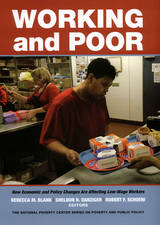
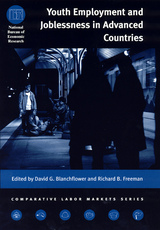
This volume brings together key studies, providing detailed analyses of the difficult economic situation plaguing young workers. Why have demographic changes and additional schooling failed to resolve youth unemployment? How effective have those economic policies been which aimed to improve the labor skills and marketability of young people? And how have youths themselves responded to the deteriorating job market confronting them? These questions form the empirical and organizational bases upon which these studies are founded.
READERS
Browse our collection.
PUBLISHERS
See BiblioVault's publisher services.
STUDENT SERVICES
Files for college accessibility offices.
UChicago Accessibility Resources
home | accessibility | search | about | contact us
BiblioVault ® 2001 - 2024
The University of Chicago Press









